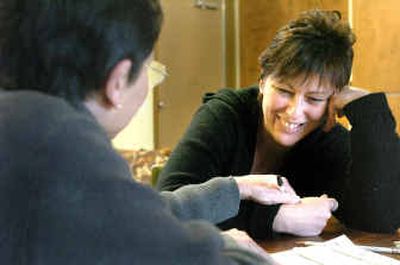Community clinics fill health-care gaps for those uninsured

SANDPOINT – Stephanie Smith panicked after a counselor told her to see a doctor for her raspy voice.
The chance of cancer didn’t alarm Smith, a recent transplant to Sandpoint from Pennsylvania. But her lack of health insurance did. She was directed to the Bonner Partners in Care free clinic in Sandpoint.
“Without this clinic, I would have had to go back to Pennsylvania,” Smith, 42, said this week. “If this is something more than a mass, I’ll still probably have to go home. Idaho better do something or it’ll only get worse.”
Idaho is doing something, one city at a time. As health insurance and medical treatment costs climb beyond the reach of even middle-income families, cities are rallying to fill in the health care gaps. Community clinics for the uninsured operate now in Coeur d’Alene, Bonners Ferry, Plummer and Kellogg. Sandpoint is the latest North Idaho city to join the movement.
“The community is only healthy when everyone in it is healthy,” said Lora Cartelli, the brains behind the Bonner clinic. “People from all walks of life are losing health insurance. The pendulum is evening out.”
Bonner Partners in Care opened 19 months ago while Cartelli was Bonner County’s community assistance director. The assistance program helps county residents pay medical bills for catastrophes, such as heart attacks. It rarely pays for preventive care because costs aren’t as extreme and don’t threaten to bankrupt patients.
“It makes no sense. If someone had heart palpitations, we wouldn’t pay for the care to avoid a heart attack,” Cartelli said. “But after the heart attack that costs $80,000, the county would step in. Part of that fund should go to maintenance care.”
Cartelli saw the effectiveness of Coeur d’Alene’s Dirne Community Health Clinic and wanted a similar safety net for Bonner County. A $35,000 federal grant in 2002 gave her the chance. Cartelli knew she needed community support, so she asked Sandpoint Super Drug for help with prescriptions and Bonner General Hospital for lab work at a reduced cost. The Community Assistance League donated money so patients could see specialists and a dozen specialists agreed to accept discount vouchers from the clinic.
Ten doctors, two physician’s assistants and 13 nurses volunteered their time. The local Lion’s Club promised help with glasses and the Panhandle Health District offered its exam rooms for clinic use. In July 2003, Partners in Care opened for service for two hours every Tuesday evening.
“A lot of uninsured people here in town won’t go to the doctor because they have no money, so they stay home sick. This is an opportunity to help,” said Dr. Robert Rust, who has practiced in Sandpoint for 30 years. He has volunteered at the clinic since it opened.
Cartelli left her county job a year ago for a half-time post running Partners in Care. It’s the clinic’s only paid position and an indulgence in belief for the woman who holds a Ph.D. in education.
“I saw so many people drop their insurance policies so they could eat,” Cartelli said. “This is something communities have to solve.”
In 19 months, the clinic has treated 332 people. Staff doesn’t stitch cuts, set broken bones, test for pregnancy or STDs, immunize, repair teeth or treat mental illness – yet. About eight people a night see a doctor. They pay at most $10.
“We’ve had people come in who haven’t seen a doctor in 10 years,” Cartelli said.
Susan Shea, who succeeded Cartelli as county assistance director, can’t tell if the clinic has reduced requests for help to her office. Still, she shared $3,000 of her $200,000 budget this year with Partners in Care for preventive care.
“It’s in the community’s best interest,” Shea said. “We do refer people to the clinic.”
Clinic doctors found a lump in Smith’s vocal chords the size of a peanut. Smith is among Bonner County’s 12,000 uninsured. She earns $343 a week caretaking – too much to qualify for Medicaid and too little to pay insurance premiums. Cartelli scrambled to find a specialist to remove the lump and find out if it’s cancerous.
A Coeur d’Alene specialist is doing the surgery but wants more than $500. Then there are the hospital charges. County assistance won’t help unless the lump is cancerous, Smith said.
“Why is the county paying for someone in jail to get medical treatment for $25,000 and I can’t get help?” she said. “Do I have to go to jail? Something is not right.”
Cartelli found Smith medication at no cost. Cartelli works with about 40 pharmaceutical companies to save 150 clinic patients the costs of prescriptions. Her next mission is to open the clinic a second night each week and convince the community to adopt the clinic as a 21st century responsibility.
“And we need dentists. They don’t help out,” she said. “And X-rays, too. And if a denture clinic could give two sets of dentures a year…”